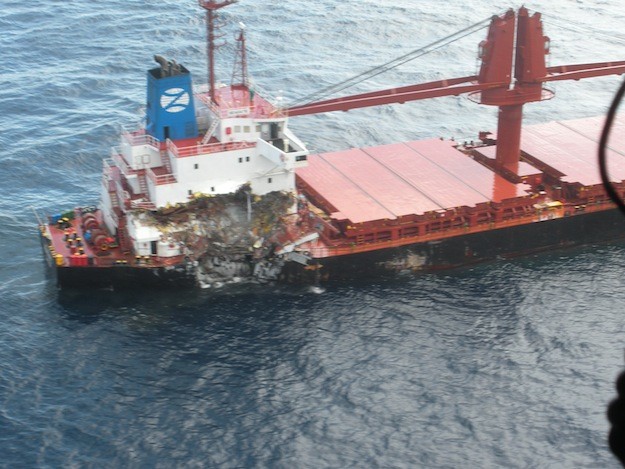An aerial view of the damage to the M/V Seagate. Luckily, no injuries were reported. Photo: USCG
A final report from the UK’s Maritime Accident Investigation Branch has revealed that poor watchkeeping, driven by complacency, led to a March 2012 collision between a bulk carrier and a reefer cargo ship off the coast of the Dominican Republic.
SEE ALSO: Seagate and Timor Stream Collision [INCIDENT PHOTOS]
On the morning of March 10, 2012, the British-flagged bulk carrier MV Seagate and the Liberian-flagged refrigerated-cargo ship MV Timor Stream collided while transiting open waters and in good visibility 24 nm north of the Dominican Republic. There were no injuries, but both ships were badly damaged and there was some minor pollution.
Prior to the collision, the Timor Stream had just left the Dominican Republic and was proceeding to the United Kingdom, while the Seagate was on passage to the west coast of Africa from Texas. According to the report, the Seagate’s chief officer saw Timor Stream but assumed it was an overtaking vessel which would keep clear. Meanwhile, the master of Timor Stream was alone on the bridge and was not keeping an effective lookout. It was too late by the time either had realized that the two vessels were on a collision course.
The Seagate was badly damaged in the collision and was taking on water. 18 of its 21 crewmembers boarded life rafts while the remaining 3 stayed on the vessel for damage assessment. The Timor Stream suffered only “minimal damage” and also no injuries.
In the report, it says that poor watchkeeping standards, driven by complacency, led to the collision. The officer in charge of the navigational watch on both vessels failed to keep a proper lookout, did not assess the risk of, or take appropriate action to avoid collision, report says. In summary, it says, both officers failed to comply with some of the most fundamental elements of the International Regulations for Preventing Collisions at Sea 1972 (as amended) and the written navigational procedures issued by their respective company managers.
The MAIB did not make any recommendations in the report.
Link: Seagate and Timor Stream Collision Report

 Join The Club
Join The Club











